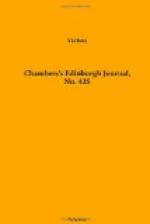AN AMERICAN CONFESSES A FAULT.
The Americans are said to be grievously addicted to ——: we would rather avoid the word. Travellers have spread the imputation; but travellers are known to speak from prejudice, and their report did not appear to be altogether trustworthy. At length, strange to say, the charge of being intolerable—must we say it?—spitters is made by one of themselves, and of course there can be no more said on the subject: the fact is confessed. This marvellously candid, but painful acknowledgment, occurs in the recently-published work, Sketches of European Capitals, by W. Ware, M.D., the well-known author of those charming historical romances, Letters from Palmyra, Aurelian, &c. We trust that Dr Ware will not be ostracised on the score of taste or patriotism by his countrymen, for his extraordinary audacity in telling them of a fault, and, what is more, in drawing an unfavourable comparison between them and Englishmen on this most delicate subject. The following are his remarks:—
’An Englishman, I believe, rarely chews, and, compared with the American, rarely smokes; but whether he does not secretly practise both these abominations, I am not prepared to say. But with both these provocatives, if it be so, one thing he never does—is to spit. That fact draws a line of demarcation between the Englishman and the American, broader and deeper a thousandfold than any other in politics, government, laws, language, religion. The Englishman never spits; or, if he does, he first goes home, shuts himself up in his room, locks his door, argues the necessity of the case; if necessary, performs the disagreeable duty, and returns to society with a clear conscience. The American spits always and everywhere; sometimes when it is necessary; always, when it is not. It is his occupation, his pastime, his business. Many do nothing else all their lives, and always indulge in that singular recreation when they have nothing else to do. Sometimes, in a state of momentary forgetfulness, he intermits; but then, as if he had neglected a sworn duty, returns to it again with conscience-smitten vigour. He spits at home and abroad, by night and by day, awake and asleep, in company and in solitude, for his own amusement and the edification of a spitting community; on the freshly-painted or scoured floor, on the clean deck of a ship or steam-boat, on parlour floors—covered whether with ingrained Brussels, Wilton, or Turkey—even there he voids his rheum; upon the unabsorbent canvas, so that one may see, where numbers congregate, the railway cars to run in more ways than one; the pulpits and pews of churches are not safe; the foot-pavement of the streets, the floors of all public places—of exchanges, hotels, of Congress halls—are foul with it; and in railway cars it must always be necessary for a lady to shorten her garments, as if about to walk in the deep mud of the street, or the




